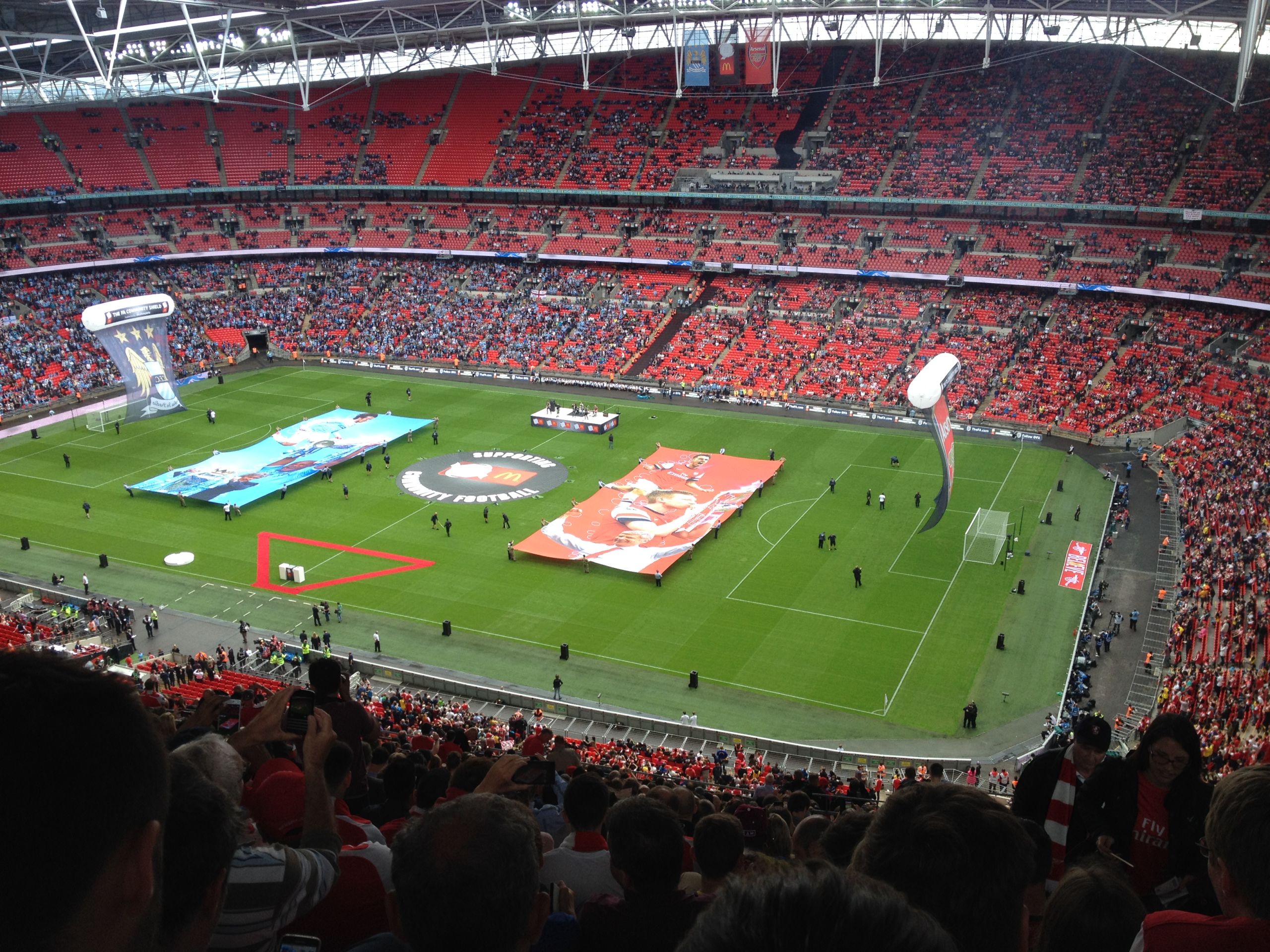Arsene Wenger:
The Arsenal Years
Examining Arsene Wenger's record at Arsenal
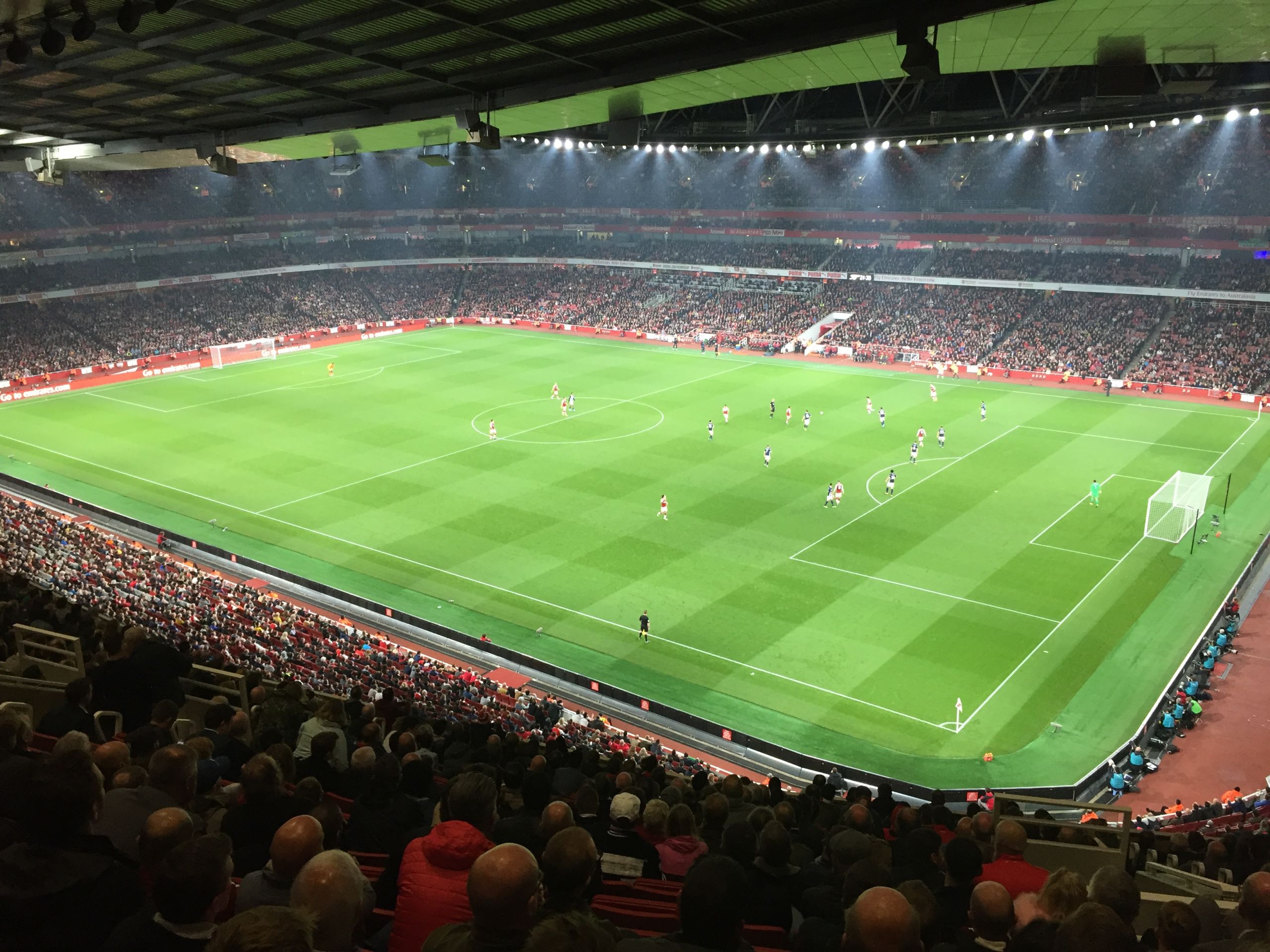
“My aspiration is that when Arsenal fans come here they are happy. It’s up to the players and me to present the game that they love. Also, I want the fans to help us in difficult periods of the season when they are inside the gates. Because no team can be attractive and fantastic for the whole season.”
This quote, in the opening prologue of Myles Palmer’s superb 2001 biography, The Professor: Arsène Wenger, was Arsene Wenger’s response when asked if he had a message for the Arsenal fans during his first press conference on September 22nd 1996.
Without doubt, Wenger made Arsenal fans very happy, especially during the first decade of his 22-year reign as manager of Arsenal FC winning the Premier League and FA Cup double in 1997/98 & 2001/02 before guiding Arsenal through the 2003/04 Premier League undefeated; picking up the Premier League trophy in the process.
Wenger would go on to lift the FA Cup a further five times in 2003, 2005, 2014, 2015 & 2017 and win the Charity Shield on seven different occasions.
Perhaps, Wenger’s message to the Arsenal fans during his first press conference would have been more appropriate if ‘season’ was replaced by ‘tenure’ as the Frenchman was unable to maintain the unprecedented early success at the club especially after the Gunners moved to the Emirates Stadium in 2006.
Arsene Wenger's official autobiography, My Life in Red and White, is due for release in October with the advance synopsis confirming Wenger is due to open up about his life, his principles for success on and off the field, as well as lessons in leadership.
Arsenal fans will no doubt be excited to reminisce over the fantastic highs and incredible achievements but will also be interested to find out how it all went wrong. Towards the end of Wenger’s tenure, there were a significant and ever-growing proportion of Arsenal fans who agreed, many silently, with the ‘Arsene-Out’ contingent and believed the time was right for Wenger to step down.
Myles, a former football correspondent for the Scotsman, 90 Minutes, FourFourTwo and the Scottish Sunday Herald, and author of the popular Arsenal News Review blog, commented: “He changed English football. He built imaginatively on George Graham’s team. But he was too doctrinal in the pursuit of his own sports science obsessions. He was the first foreign manager to be successful in England and his success opened the door to many others. His tenure will remain a golden era in football history.”
This article looks back over Wenger’s career at Arsenal and extrapolates statistics to help compare and contrast, as well as explore, the highs and lows of Arsenal’s most successful manager.
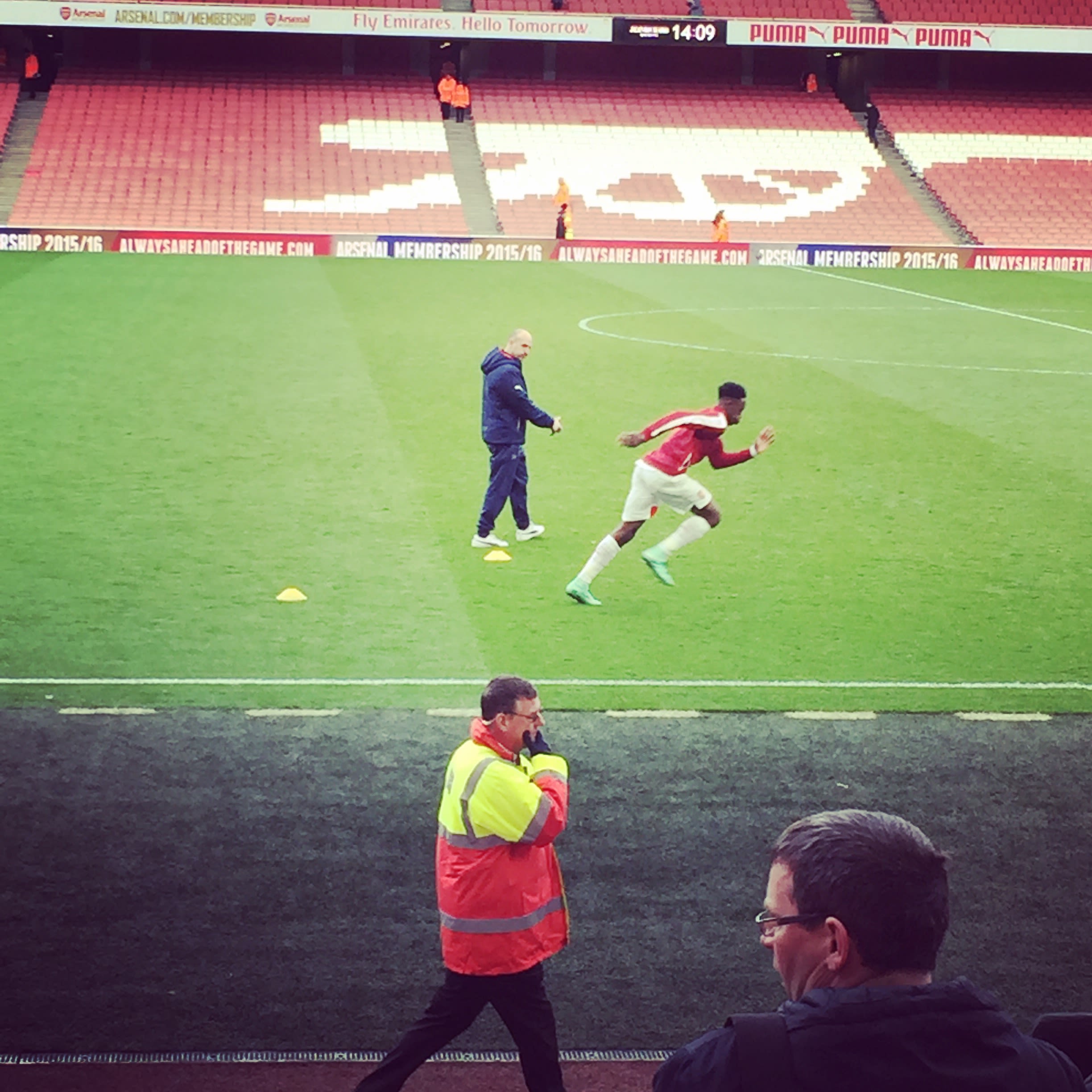
Arsene Wenger was born in Strasbourg, France, in 1949. He enjoyed a modest playing career in France, with Mulhouse and later Strasbourg, playing predominantly as a midfielder but was also used in a more defensive role.
Following his playing career, Wenger spent a year as assistant manager of French Ligue 2 side, Cannes, during the 1983/84 season, before taking over as head coach of French Ligue 1 side, Nancy, at the start of the 1984/85 season. Wenger’s reign at Nancy ended in the summer of 1987 following a 19th place finish and relegation.
Wenger was appointed manager of Monaco in the summer of1987 and led the Monégasques to the Ligue 1 title during his first season in charge. Monaco finished six points clear of their closest rivals Bordeaux with a squad containing England Internationals Glenn Hoddle and Mark Hately. It is also worth noting that Monaco secured the league with a total of 52 points and a record of P38, W20, D12, L6.
Wenger was dismissed as manager of Monaco in September 1994 having failed to repeat the title glory of his debut season.
The Frenchman then made, what was considered by most at the time, quite a left-field decision to take over at Japanese side Nagoya Grampus in early 1995. During his relatively brief spell in Japan he won the 1995 Emperor’s Cup and 1996 Japanese Super Cup.
Arsenal had finished fifth during the 1995/96 season under Bruce Rioch. Rioch had restored some parity at the club after Arsenal had slipped to a 12th place finish in 1994/95 following George Graham’s departure. However, Rioch was sacked just before the start of the 1996/97 campaign.
“Arsène Who?” was the renowned two-word London Evening Standard bill-poster headline that greeted Arsène Wenger on his appointment as Arsenal manager.
Arsene Wenger arrived in London in September 1996. David Dein, Arsenal’s Vice Chairman at the time, had met Wenger in the late 1980s at Highbury and the two had retained a personal friendship over the subsequent years. Wenger was appointed largely on Dein’s recommendation.
Before joining up with his new squad in September 1996, Wenger had recommended two signings; Patrick Vieira and Remi Garde. Otherwise, the squad Wenger inherited still contained the bulk of players brought through by George Graham in the late 1980s with the addition of Dennis Bergkamp who had arrived the year before.
Arsenal had won the old First Division in 1988/89 and repeated that triumph in 1990/91. Graham’s side won the domestic double in 1992/93 and the Cup Winners Cup in 1993/94.
Myles, when asked if Wenger gave enough credit to George Graham, said: “I spent a lot of time with Arsene, along with other reporters, and he never mentioned George once. That is astonishing since he inherited the best back five in Europe, plus Paul Merson, Ray Parlour and Ian Wright. The defence, with Dave Seaman in goal was a magnificent unit. For a manager who wanted to play attacking football, that was a huge bonus. He also inherited Dennis Bergkamp and improved the Dutch star by challenging him and building round him. But Bergkamp refused to fly and that was costly.”
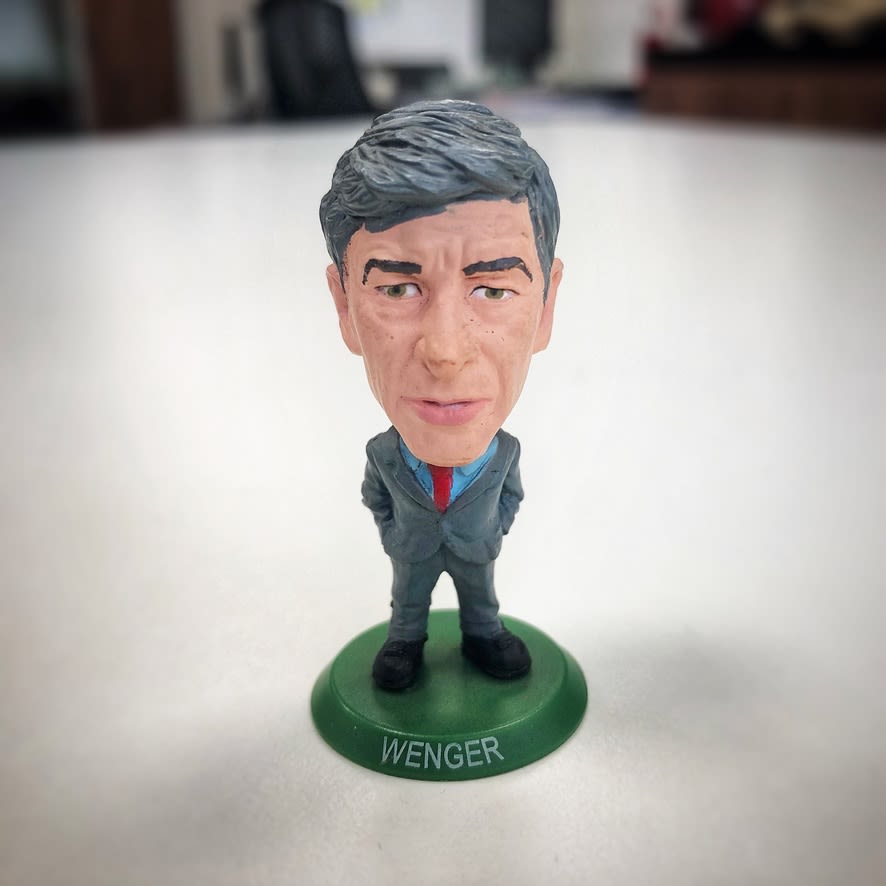
Wenger managed Arsenal a total of 1,235 times over the course of 22 seasons at the Gunners, reaching two European Cup finals along the way. However, Arsenal lost both, missing out in the Champions League Final in 2006 to Barcelona and the UEFA Cup Final in 2000 to Galatasaray on penalties.
It is the failure to win the Champions League that Myles believes is Wenger’s biggest regret:“I don’t think he can explain why he never won a European trophy. Why did he take Robert Pires off in the Paris final against Barcelona, leaving Ljungberg on? Arsenal were a man down after Jens Lehman was sent off. They needed to keep the ball and Pires is one of the cleverest ball-keepers we have ever seen.”
Wenger enjoyed enormous success in the early period of his Arsenal career culminating in the unbeaten season of 2003/04, when Arsenal won their third Premier League title under Wenger for the third time in eight years.
Despite finishing second in the league in 2004/05 (Arsenal finished 12 points behind Chelsea) and 2015/16 (Arsenal finished 10 points behind Leicester City) the closest Arsenal came to regaining the title, in terms of points, was 2007/08 (Arsenal finished four points behind Manchester United).
In February 2008, Arsenal found themselves five points clear at the top of the table, with 12 games to play, before travelling to Birmingham City on February 23rd. Four draws and one defeat in five games would prove fatal in terms of Arsenal’s title challenge.
Arsenal finished inside the top four for 20 successive years before finishing fifth and sixth during Wenger’s final two years at the club.
The Frenchman oversaw Arsenal’s move from Highbury to the Emirates Stadium in July 2006, a move that coincided with Arsenal’s increasing difficulty in competing against the top teams.
As evidenced, Arsenal’s Premier League home record at Highbury, under Wenger, was superior to their record at the Emirates. Arsenal won 72.04% of their Premier League games between 1996 and 2006, as opposed to 66.67% at the Emirates.
One notable difference between the two stadiums was Arsenal’s goals scored per-game. Arsenal averaged 2.26 goals-per-game at Highbury compared with 2.10 goals-per-game at the Emirates. Interestingly, Arsenal conceded 0.81 goals-per-game across both grounds.
Wenger enjoyed a successful head-to-head record against the majority of his managerial adversaries during his tenure at Arsenal albeit with some exceptions.
Jose Mourinho was the first manager to consistently outwit Wenger. Wenger lost five and drew seven Premier League games before Arsenal finally overcame Mourinho’s Manchester United side, 2-0, in May 2017. This run included a 6-0 defeat away to Chelsea in March 2014.
He was not averse to suffering some heavy defeats during his stint as manager. Wenger’s Arsenal, recorded similarly embarrassing score lines to Alex Ferguson’s Manchester United (Arsenal lost 6-1 in February 2001 & 8-2 in August 2011). Additionally, Arsenal lost 10-2 on aggregate to Carlo Ancelotti’s Bayern Munich in the 2016/17 Round 16 Champions League clash.
Wenger’s first game in charge of Arsenal was away to Blackburn Rovers, at Ewood Park, on October 12th 1996.
Wenger started with a 3-5-2 system, not wanting to make any immediate changes to the side, utilising Nigel Winterburn and Lee Dixon as wing-backs. Arsenal beat Ray Harford’s Blackburn side 2-0 courtesy of an Ian Wright brace.
The final game of the Arsene Wenger era came at John Smith’s Stadium in May 2018. Arsenal ran out 1-0 winners, courtesy of a Pierre-Emerick Aubameyang strike. Both sets of fans gave Wenger a standing ovation at the 22 minute mark.
While Wenger’s first side contained nine Englishmen, a Welshman (John Hartson) and a Frenchman (Patrick Vieira) – Wenger’s final starting XI contained only one Englishman (Holding) and one Welshman (Ramsey), proving how the Premier League evolved over the course of 22 years.
Theo Walcott made the most appearances (397) under Wenger and therefore makes it into Wenger's 'Most Capped XI'. Dennis Bergkamp, Patrick Vieira, Martin Keown and Ray Parlour all preceded Wenger, at Arsenal, and all contributed significantly to the three Premier League titles.
Bacary Sagna (who holds the 11th highest number of appearances under Arsene Wenger) misses out due to the requirement for a goalkeeper.
As mentioned, Myles Palmer believes that Wenger’s biggest regret is his failure to win the Champions League with Arsenal.
Although Arsenal came close on one occasion, losing 2-1 to Barcelona in the Champions League Final in 2006, Wenger’s record in Europe leaves itself open to criticism. The 2006 Champions league final, which Arsenal lead 1-0 until the 76th minute, came at the end of that team’s cycle. Arsenal finished 4th in the league and 24 points behind Premier League winners Chelsea.
In hindsight, Arsenal’s best opportunity to win the Champions League came during 2003/04, the year of the Invincibles, but Arsenal came up short in the quarter finals against a Wayne Bridge inspired Chelsea.
For seven consecutive years, between 2011 and 2017, Arsenal were eliminated at the last 16 stage of the competition. Rather too predictably, valiant second-leg displays were often not quite enough to overturn heavy first-leg defeats.
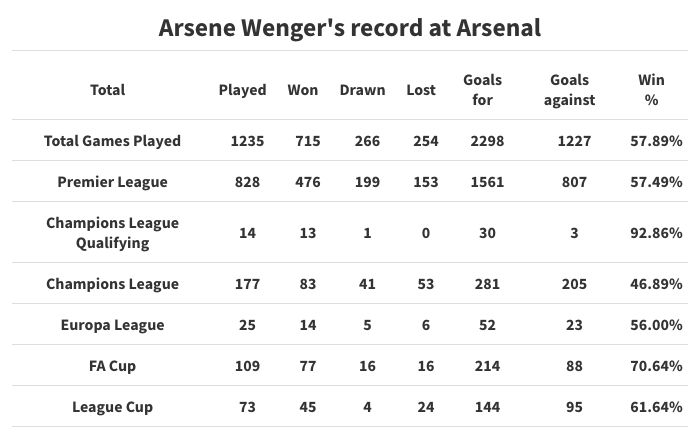
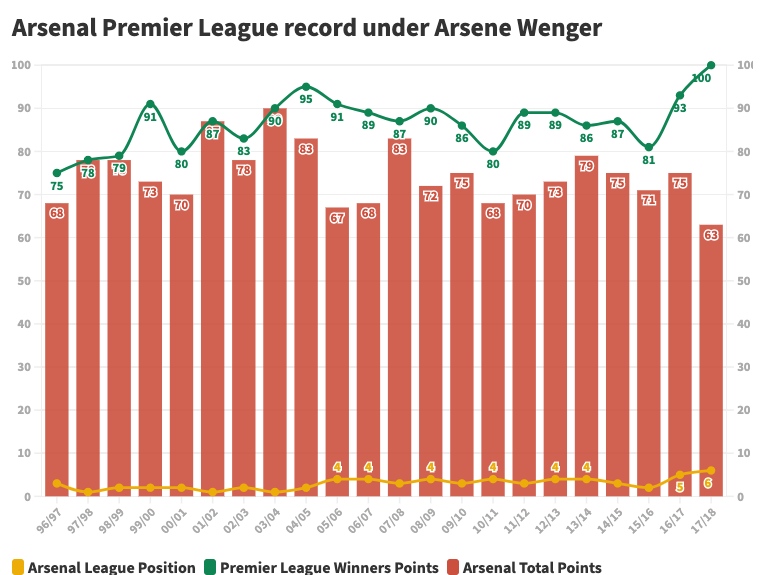
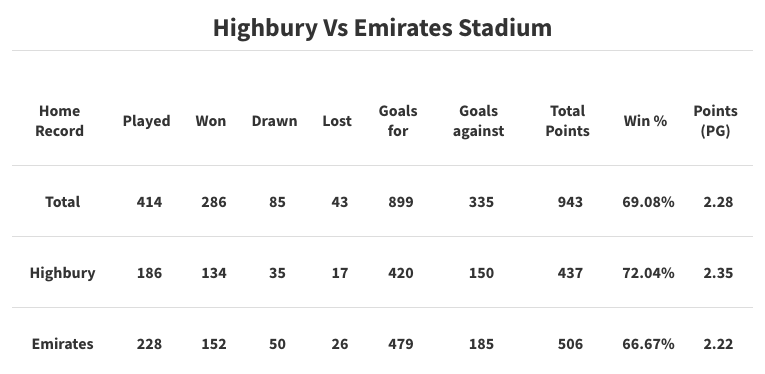
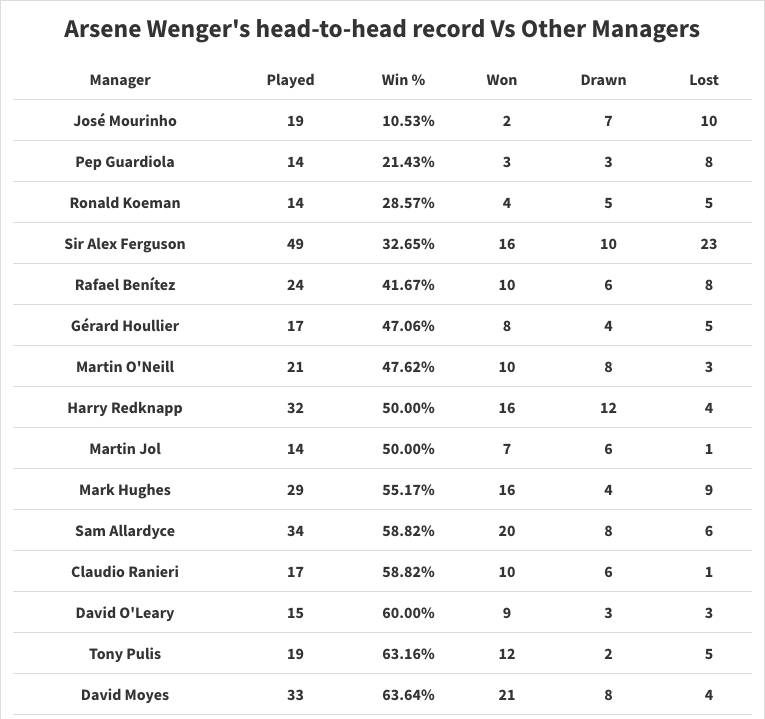
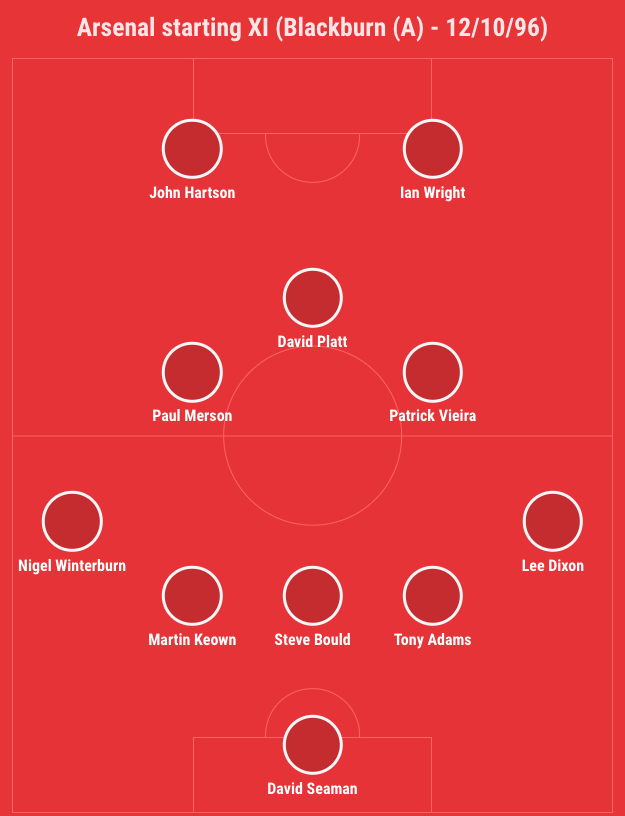
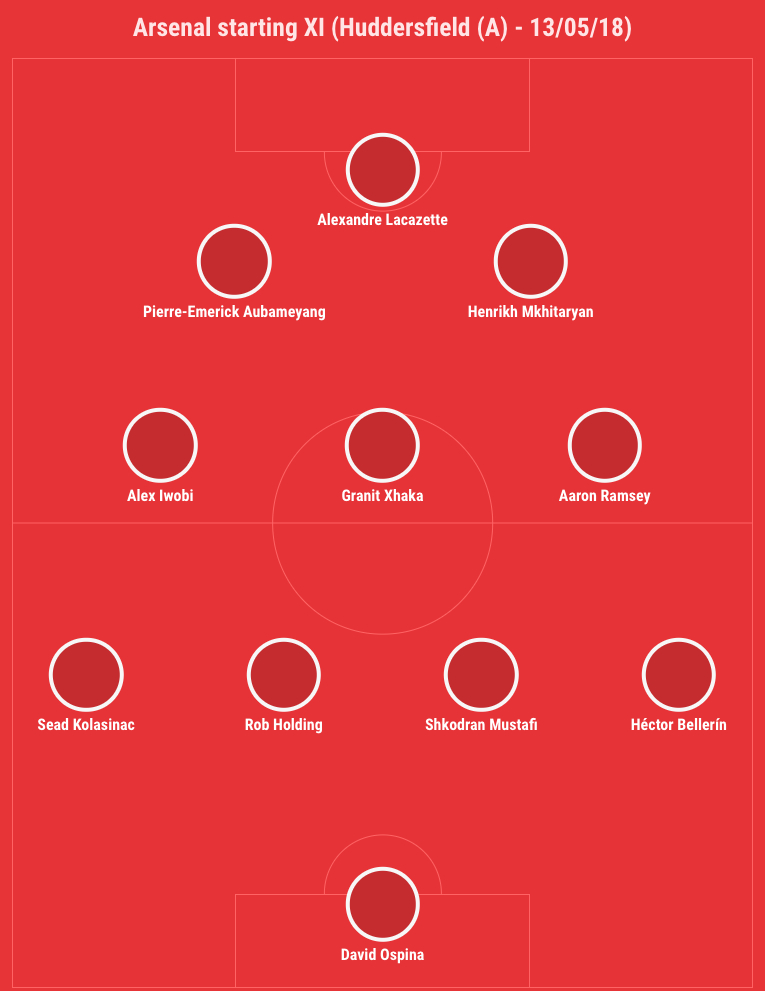
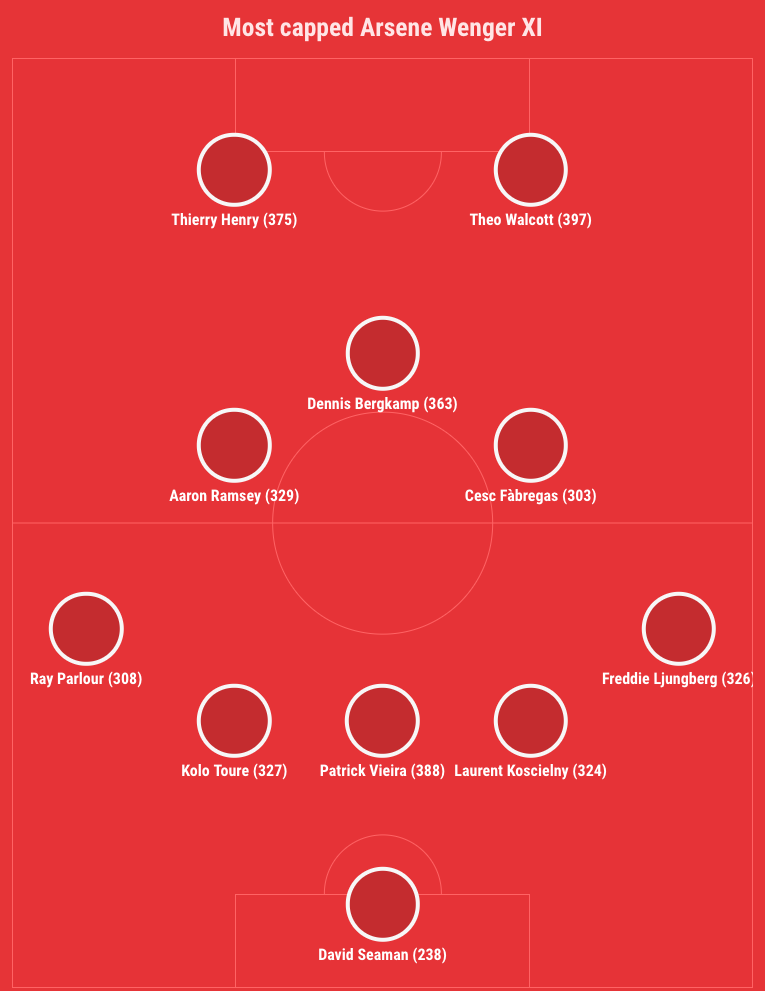
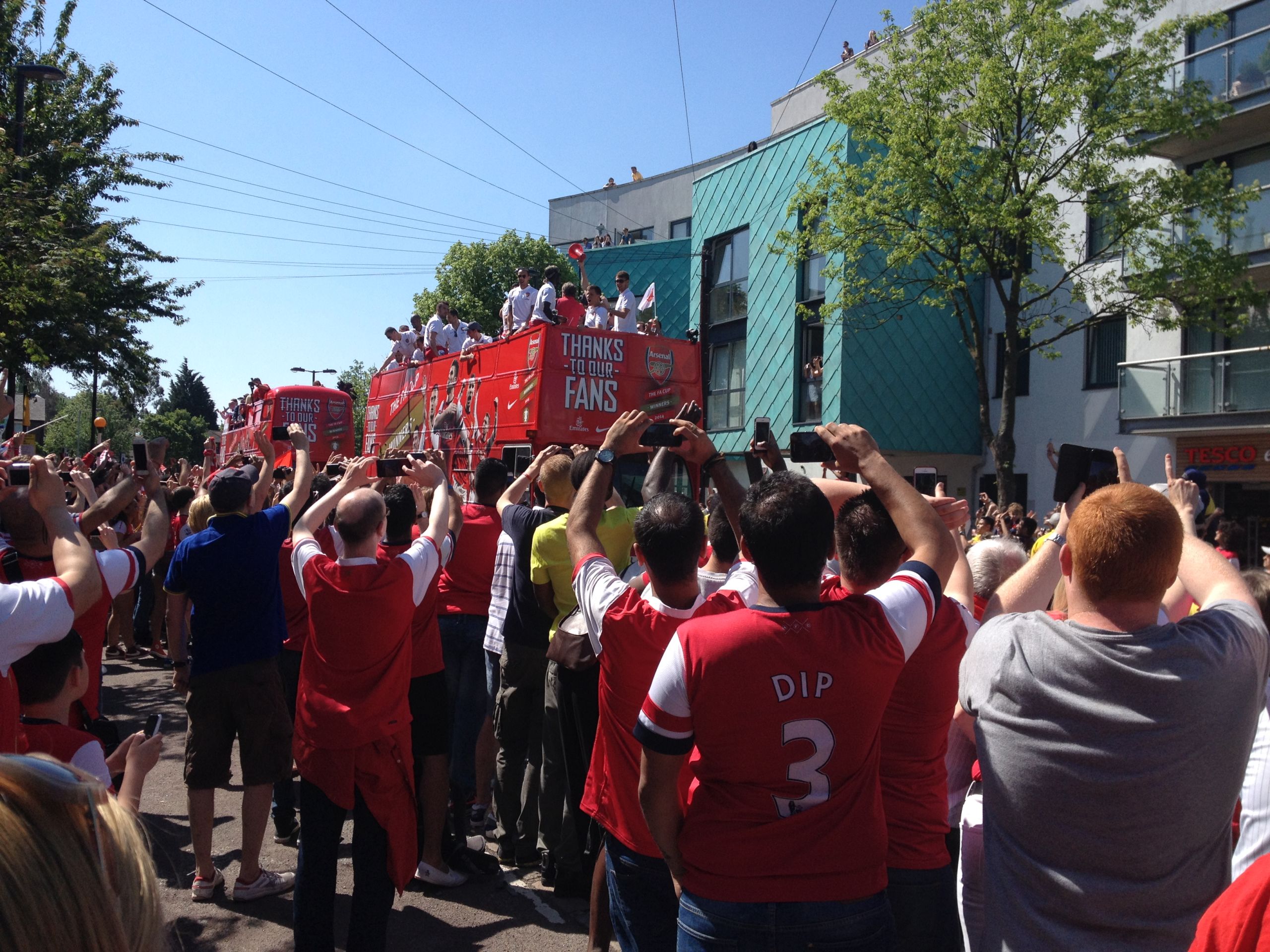
Arsenal fans celebrating the 2016 FA Cup win
Arsenal fans celebrating the 2016 FA Cup win
Wenger steered the club through an unprecedented period of financial growth during his time as Arsenal manager. Revenue grew exponentially, across all channels, over 22 years.
Arsenal moved to the Emirates Stadium at the start of the 2006/07 season, a decision made largely to increase gate receipt revenue. At around the same time broadcasting revenue began to reach parity and subsequently overtook gate receipts as the club’s main source of income.
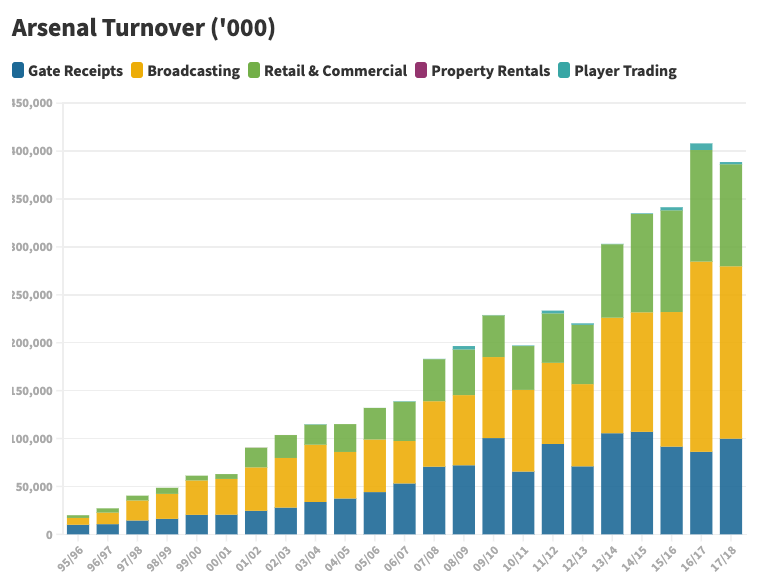
Arsenal reached the quarter final stage in the Champions League in 2009/10 and the graph shows how financially rewarding it was for Arsenal to stage one more Champions League game at home that season.
Ivan Gazidis arrived as Arsenal’s CEO on 01st January 2009. Despite Arsenal’s lack of success on the pitch, especially following David Dein’s departure from the club in April 2007, Arsenal’s retail and commercial revenue grew substantially during Gazidis’ time at the club.
As turnover increased, so did player and staff wages. The below graph shows the year-on-year revenue vs player and staff wages.
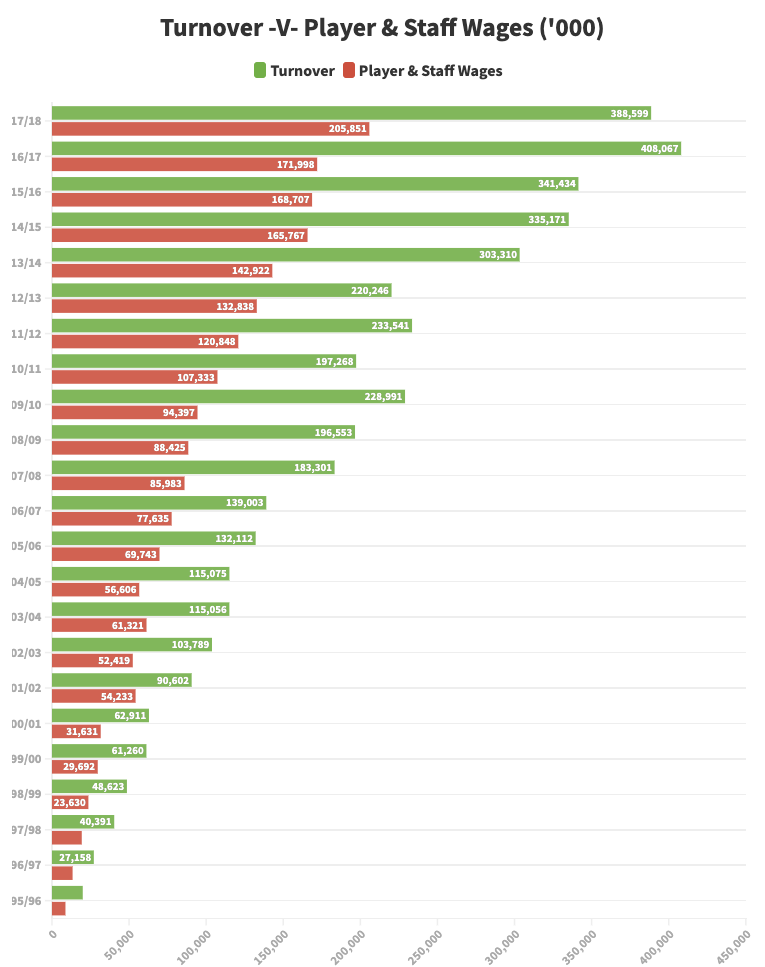
It is interesting to note that player and staff wages remained relatively static from 2001/02 (double-winning side) until the end of the 2004/05 season. It was widely reported that Arsenal were trying to reduce costs at the time to accommodate their move to the Emirates Stadium.
Hindsight shows that Arsenal lost their competitive edge at around the same time and many would argue that Arsenal were playing catch up from that point onwards. This period also coincided with Roman Abramovich, the Russian billionaire businessman, taking over Chelsea in the summer of 2003.
Arsenal began to report their social media following from 2014. As Arsenal.com visits decreased from 2014 onwards, the data shows that Arsenal fans turned to other platforms for their news with Facebook & Twitter followers growing substantially year-on-year.
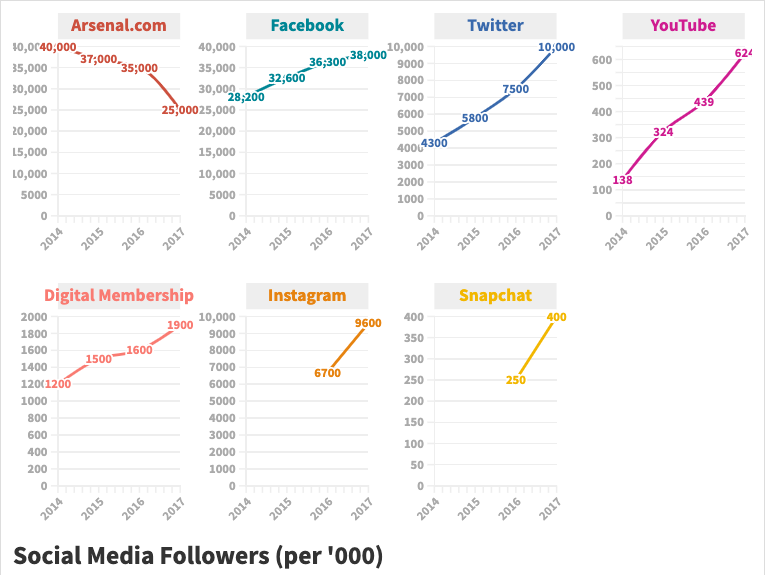
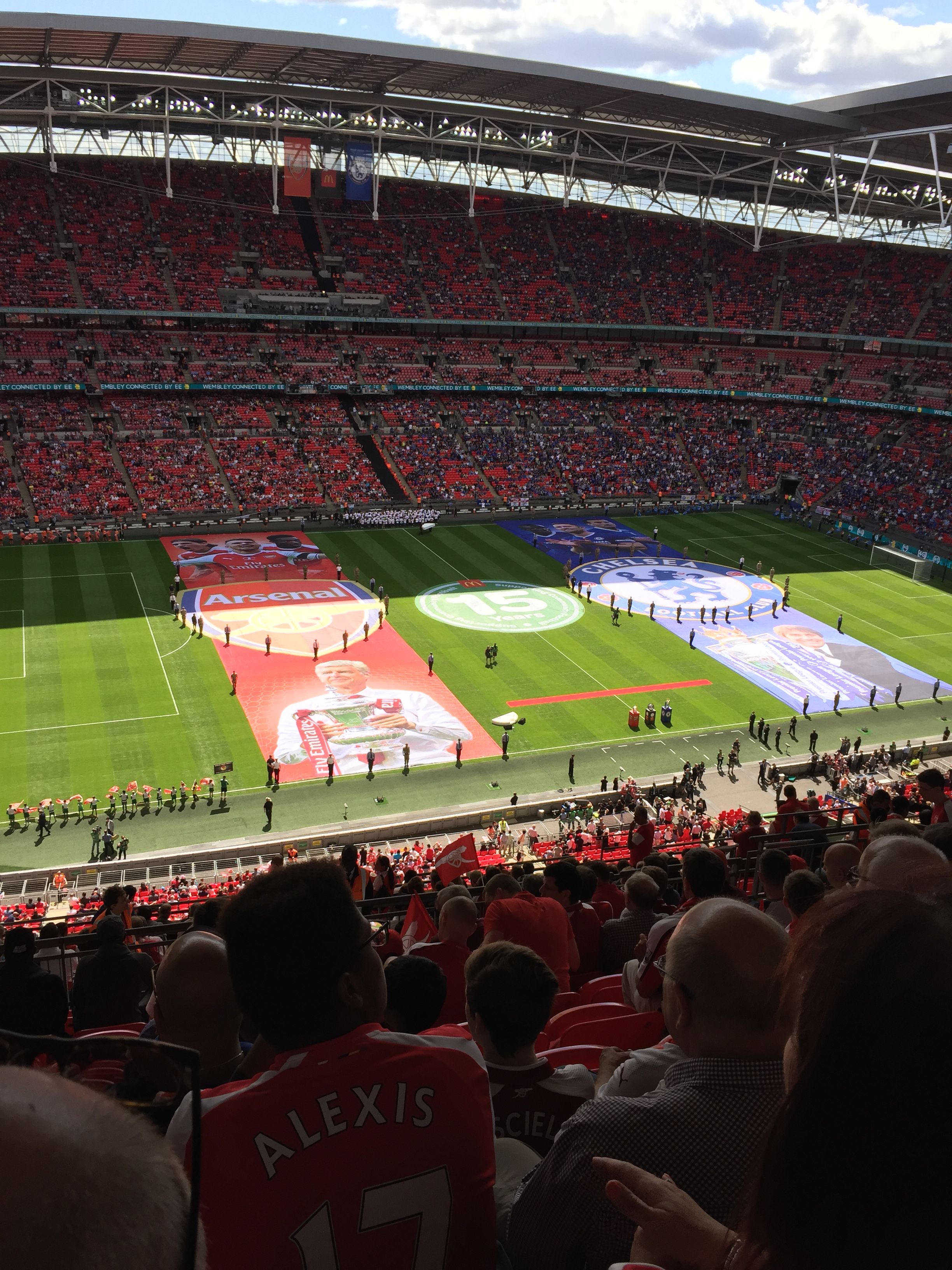
Wenger’s Arsenal sides were often lauded in the media for their attacking verve, however, the 2005 FA Cup Final victory over Manchester United on penalties is testament to Wenger’s ability to compromise at times.
A criticism aimed at Wenger was that he would always favour bringing in an attacking player over reinforcing his back line. On more than a few occasions, come the end of the transfer window, it felt Arsenal were just a central defender and defensive midfielder away from challenging for the title.
The below graph details goals scored and goals conceded and also tracks Arsenal’s top goalscorer each season.
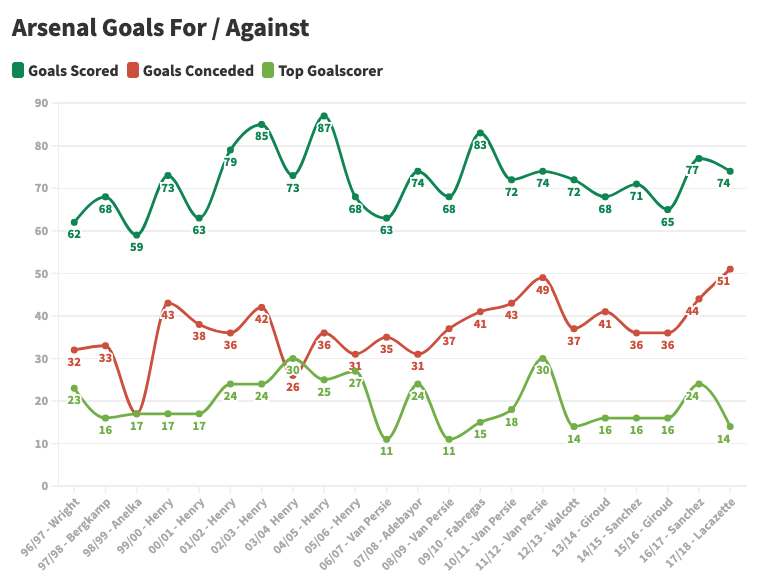
It is striking that after Henry left Arsenal at the start of the 2007/08 season, Arsenal didn’t have a consistent finisher who could score over 20 goals a season. Adebayor, Van Persie and Sanchez each had one prolific season, but none of them were able to repeat that prowess in front of goal again (although, in Van Persie's case this was predominantly due to injuries).
The below, interactively shows all Arsenal’s goalscorers, across Wenger’s time in charge.
The below, interactively shows Arsenal’s goalscorers by nationality, across Wenger’s time in charge.
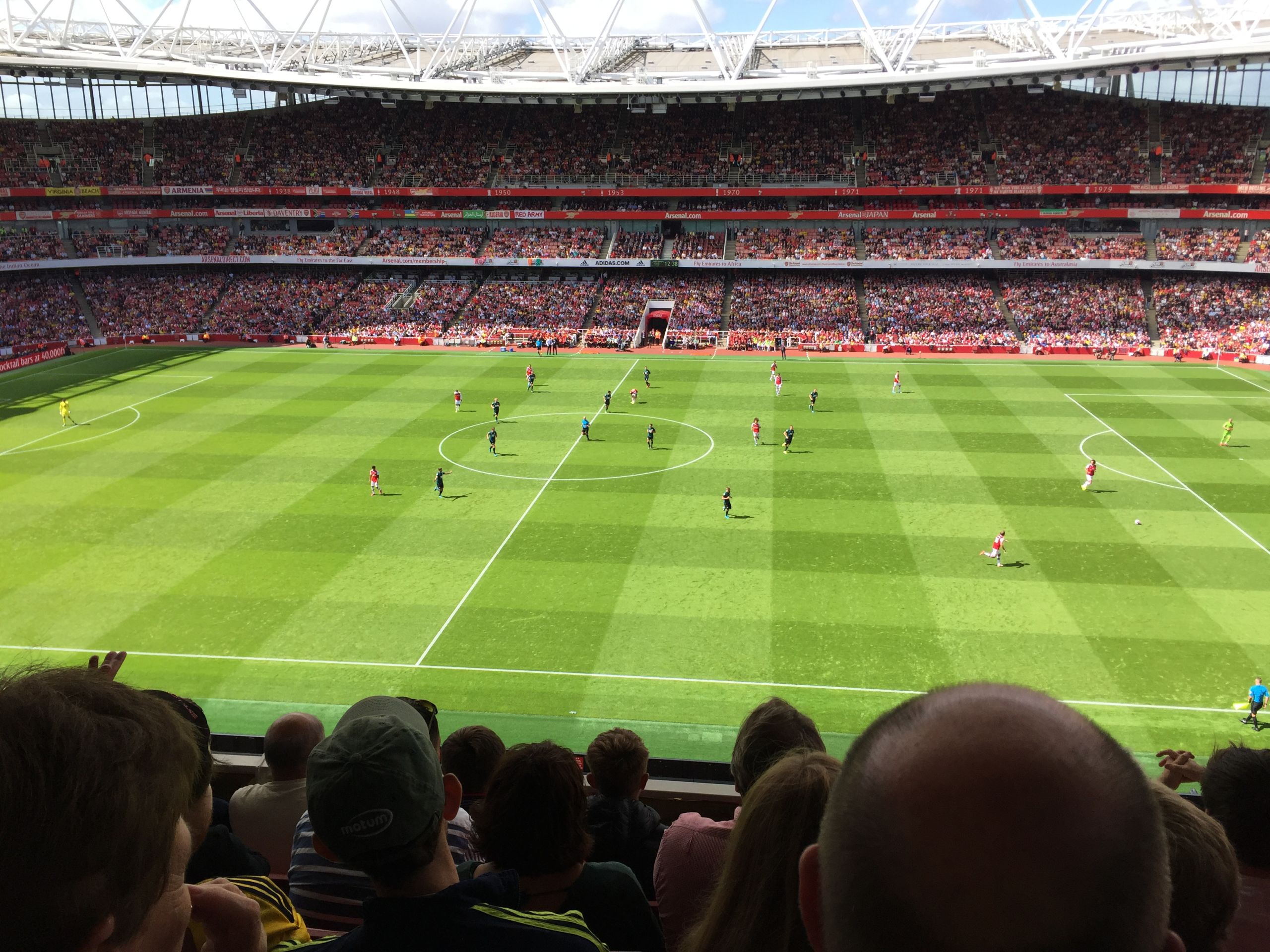
Wenger’s greatest achievement at Arsenal is the 2003/04 invincible season when Arsenal went unbeaten for the entire season. This hadn’t been achieved since Preston North End in 1888/89, albeit PNE only played 22 league games that year.

Wenger’s 2003/04 side is widely considered the best side of his 22-year-stint as manager at Arsenal.
Arsène Wenger enjoyed a lot of success in the early years of his 22 year tenure at Arsenal FC.
— TheDublinDestroyer (@Cornelimar) June 12, 2020
Which side do you think was his best?#Arsenal #wenger #Arsene #Gooners
The core of the side were Jens Lehmann (33), Lauren (23), Kole Toure (22), Sol Campbell (26), Ashley Cole (22), Freddie Ljunberg (26), Patrick Vieira (27), Gilberto Silva (26), Robert Pires (29), Dennis Bergkamp (34) & Thierry Henry (26). However, this side only started two league games together during the entire season.
The below map records more details of each squad member who made an appearance during the 2003/04 Invincible season.
Arsenal won the league at White Hart Lane in 2003/04 following a 2-2 draw against Tottenham Hotspur. Highlights of the game are below.
🏟️ Invincibles win the Premier League at White Hart Lane!
— Sky Sports Premier League (@SkySportsPL) April 25, 2020
OTD in 2004, Arsenal drew 2-2 at Spurs to clinch the Premier League title 🏆 pic.twitter.com/rx313igi96
The below video, courtesy of The Arsenal on Youtube, looks back at the highlights of Arsene Wenger’s career at Arsenal.
